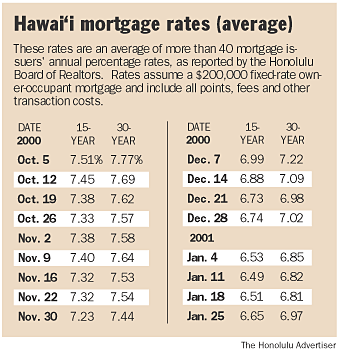By John Duchemin and Glenn Scott
Advertiser Staff Writers
Hawai‘i consumers and businesses are expected to feel immediate and far-reaching effects from yesterday’s move by the Federal Reserve Board to further pare interest rates and stimulate a rapidly slowing U.S. economy.
The central bank’s cut of half a percentage point in its target federal funds rate — the rate at which banks borrow from one another — is expected to bring down borrowing costs on goods and services in virtually every corner of the economy.
Hawai‘i mortgage lenders said yesterday they are planning to further shave interest rates on long-term home loans. Hawai‘i banks yesterday quickly cut their prime lending rates on the news, meaning small businesses will find their short-term borrowing costs will drop. And credit card holders may see their monthly bills go down slightly, if they haven’t already.
Many in Hawai‘i also said yesterday that the cut provides hope for continued growth in the state’s economy by boosting flagging consumer confidence on the Mainland, which has accounted for much of a recent boom in the state’s key tourism and housing industries.
Spurred by growing signs of near-zero growth on the Mainland, the Fed’s Open Market Committee yesterday lowered its target federal funds rate to 5.5 percent from 6 percent. It was the Fed’s second half-percentage-point cut in the past month.
On the Big Island’s Kona Coast, Tom O’Leary, president of Western Pacific Mortgage Inc., called the rate cut "very positive news" that should help sustain the real estate sales and residential construction that has driven the area’s economy for the past three years.
O’Leary’s 30-year rate stood at 6.62 percent yesterday, and his 15-year rate dropped to 6.0 percent. Rates had dropped to a similar level about 18 months ago, he said. "But I don’t think our market was as brisk then as it is now."
Ron Aronson, president of Kona Coast Realty, shared the optimism, noting that a majority of Kona Coast home buyers are from the Mainland’s West Coast. He figured that the Fed’s commitment to restart Mainland growth would ensure that Kona’s economy remains in good shape.
"If the recession doesn’t really eat too much into the West Coast — and I don’t think it has so far — we might just weather this without too much impact," he said.
John Harris, president of RE/MAX Honolulu and co-owner of RE/MAX Maui, said home sales picked up in early January after the Fed’s first rate cut.
Harris said he anticipates having a hectic weekend, especially since the rate cuts have occurred during the busy buying season when Mainlanders escaping cold weather get more serious about living in Hawai‘i.
"I just canceled a golf game," he said. "I’m ready to go."
On Maui, Bob Casey, manager of Western States Mortgage Co., said dropping mortgage rates will help two groups of buyers.
The first are the Mainland investors looking for second homes in Hawai‘i. The second are local buyers — families with adults working two jobs each to qualify for a mortgage — who lately have been feeling the pinch of Maui’s rising home prices, which have climbed 10 percent to 20 percent in the past year.
Casey said his company, a mortgage bank, will be dropping its 30-year rate from the market average of 6.87 to as low as 6.5 percent today. The lower rate means a monthly savings of $62 on the principal and interest on a $250,000 loan, from $1,642 to $1,580.
"This is going to expand that lower end of the market of people who have been bumped out by rising prices," he said.
Although mortgage rates are tied to bond rates more than the federal funds rate, Casey doesn’t expect the 30-year rate to rise again soon.
"Everybody’s talking about it staying down for a little bit," he said. "My prediction is it’ll go down a little more."
Also yesterday, First Hawaiian Bank, Bank of Hawaii and American Savings Bank all announced they will cut their prime lending rates from 9 percent to 8.5 percent effective today. The cut will result in short-term loan rates dropping for small and medium-sized businesses.
Those loans are more short-term than the usual consumer loan, and are thus often tied to the prime rate, said Gabriel Lee, senior vice president of commercial banking for American Savings Bank.
Rates have already fallen for treasury bonds, credit cards, home mortgages, home equity credit lines, car loans and personal loans, Lee said. Those rates are driven by the market, and started to fall weeks ago, thanks to accurate predictions that the Fed would move to cut rates.
Still, Hawai‘i also could see some drawbacks from the rate cut. With lower lending rates, banks may not be able to afford to offer high dividends to customers with deposit and savings accounts.
On the deposit side, banks are expected to immediately begin lowering the rates they pay for certificates of deposit. That’s because they don’t want to get stuck paying higher CD rates to customers if the Fed further drops the prime rate, Lee said. Banks also likely will offer CDs with shorter terms — one, three or six months, rather than one year or five years — so they can roll over the money into lower-rate CDs if the Fed cuts again rates, Lee said.
Money market and savings account rates all will fall. But, said Lee, these tend to lag because they are driven more by local market competition than by policy decisions in Washington.
[back to top] |


